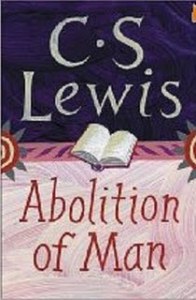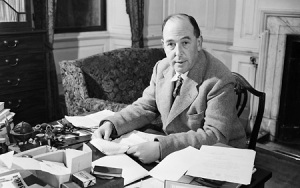 For the third Saturday in a row, I want to share some poignant excerpts from C. S. Lewis’s The Abolition of Man, a small book with rather large insights. Taken from lectures he gave, and published in 1943, it remains astoundingly relevant today as we watch our civilization teeter on the edge of utter rebellion against God-given natural law.
For the third Saturday in a row, I want to share some poignant excerpts from C. S. Lewis’s The Abolition of Man, a small book with rather large insights. Taken from lectures he gave, and published in 1943, it remains astoundingly relevant today as we watch our civilization teeter on the edge of utter rebellion against God-given natural law.
Lewis takes aim at the change in education during his time, and its attempt to replace undeniable truths with man-made ones. As he comes to the end of his argument, he points specifically to those who believe they can control nature and mold and shape mankind into whatever they choose:
Man’s conquest of Nature, if the dreams of some scientific planners are realized, means the rule of a few hundreds of men over billions upon billions of men. There neither is nor can be any simple increase of power on Man’s side. Each new power won by man is a power over man as well.
The belief that men can cast aside God’s natural moral order and create one of their own is not new, but we can see it even more clearly in our day. Lewis says this is attempted via our education system, yet he also points to why the “planners” have trouble achieving their goals:
For the power of Man to make himself what he pleases means . . . the power of some men to make other men what they please. In all ages, no doubt, nurture and instruction have, in some sense, attempted to exercise this power. But the situation to which we must look forward will be novel in two respects.
In the first place, the power will be enormously increased. Hitherto the plans of educationalists have achieved very little of what they attempted and indeed . . . we may well thank the beneficent obstinacy of real mothers, real nurses, and (above all) real children for preserving the human race in such sanity as it still possesses.
But the man-moulders of the new age will be armed with the powers of an omnicompetent state and an irresistible scientific technique: we shall get at last a race of conditioners who really can cut out all posterity in what shape they please.
Even though Lewis usually avoided direct political commentary, he was well aware of the detrimental effects of what he termed the “omnicompetent state.” Once the dreams of the “planners” become the dreams of the politicians, only evil can follow.
 The problem is then compounded by what Lewis sees as the second difference from the past: no longer do these planners feel bound to natural law and the traditional ways of thinking that accompany it. Previous ages always handed on to the next generation what they had received, in the same manner as birds teach their young ones how to fly. No more, says Lewis:
The problem is then compounded by what Lewis sees as the second difference from the past: no longer do these planners feel bound to natural law and the traditional ways of thinking that accompany it. Previous ages always handed on to the next generation what they had received, in the same manner as birds teach their young ones how to fly. No more, says Lewis:
This will be changed. Values are now mere natural phenomena. Judgements of value are to be produced in the pupil as part of the conditioning. Whatever Tao [natural law] there is will be the product, not the motive, of education.
The conditioners have been emancipated from all that. It is one more part of Nature which they have conquered. The ultimate springs of human actions are no longer, for them, something given. . . . It is the function of the Conditioners to control, not to obey them. They know how to produce conscience and decide what kind of conscience they will produce. They themselves are outside, above.
These “conditioners” are the new masters of humanity. They will decide what is right and what is wrong based on their own views, not God’s. Lewis concludes,
The Conditioners, then, are to choose what kind of artificial Tao they will, for their own good reasons, produce in the Human race.
If that sounds scary to you, you have the right reaction. I won’t take time to try to point out the myriad ways this has occurred in our society at present. You can, I’m sure, come up with examples yourself.
Next Saturday, I’ll complete these thoughts from The Abolition of Man.
